Carrion Sùil-taibhsear
| Carrion | |||||||
| Male Tiefling | |||||||
| Player: SamB12345 | |||||||
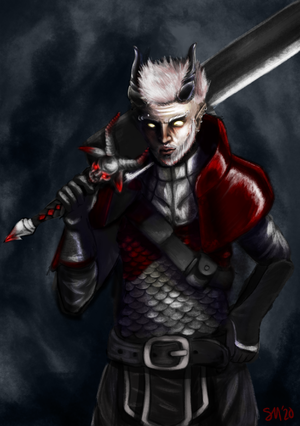
|
| General Information | ||||||||||
| Full Name: | Bain "Carrion" Sùil~taibhseár | |||||||||
| Nicknames: | Carrion | |||||||||
| Age: | 27 | |||||||||
| Deity: | Math Mathonwy, The Morrígan | |||||||||
| Alignment: |
| |||||||||
| Occupation: | Warrior-Scholar, former gladiator | |||||||||
| Faction/Rank: | Sign of One / Factotum | |||||||||
| Place of Birth: | Prime of Coimhlint Ghéar | |||||||||
| Physical Attributes | ||||||||||
| Height: | 6tf/1.8m | |||||||||
| Weight: | 174 lbs/79kg | |||||||||
| Eyes: | Luminous, yellow | |||||||||
| Hair: | Platinum blonde, short beard | |||||||||
| Complexion: | Pallid, ash-gray | |||||||||
| Physical Build: | Lithe, Ectomorph | |||||||||
| Physical Features: | Cranial horns, barbed ridge on back, leathery skin, tattoos | |||||||||
| Skills | ||||||||||
| Disciplined, knows the Planes, intimidating, skilled at deciphering writing and glyphs. | ||||||||||
| Equipment and Items | ||||||||||
| Greatsword, Brigandine Armor | ||||||||||
Theme Song
"To Hell or the Hangman" by Primordial
Disposition
Trait
I live by my wits, adapting to the milieu and cultivating power.
Ideal
Though I may not know their ways, neither do they know mine, which can be to my advantage.
Flaws
I have a weakness for the exotic beauty of female tieflings and half-fiends. I never show charity, believing it to be "unselfish love".
Carrion Sùil~taibhseár is a tiefling with definite presence. Well-mannered as a rule, he also has a darkness. There's an almost magnetic sense of danger about him.
Carrion doesn't seem too fond of most goodly priests and of fewer paladins, but he's obviously not an Athar. In fact, he freely admits to the worship of both Math Mathonwy and The Morrígan. The tiefling's demeanor is charming, and his attitude pragmatic. Carrion sneers at the ideals of love and charity, but he embraces the virtues of artifice and adroitness, as well skill at arms. Cruel as needed and kind when desired, he never lets anything interfere with his goals.
Aspect
Cranial horns and leathery skin reveals Carrion Sùil~taibhseár's fiendish nature. Pale yellow eyes peer at you in a hard-boiled gaze. Hidden underneath his raiment, a barbed ridge elongates down his upper spine. The tiefling's platinum, short hair is slicked back with lime-water, and his beard is well-trimmed. You might see a tattoo stretching across his right shoulder blade, depicting a raven and a Triskelion; and a tattoo on the bridge of his nose, depicting the Awen.
The Binder outfits himself in Celtic garb. His casual attire includes a tartan cloak, a stylized tunic, and bracae trousers. The tiefling's armor is comprised of brigandine - leather lined with steel plates - and spiked, leather spaulders. In either outfit, he dons leather vambraces and a torc.
Backstory
Bain "Carrion" Sùil~taibhseár, the tiefling Binder, relaxes in the common room of Airion’s Boardinghouse and sips viperwine, a poisonous drink lethal to humanoids. He takes the antidote. Next cycle, Carrion was to meet with a Sign of One representative and demonstrate a vision as part of his entry into the faction. This antipeak, the tiefling slips into memories.
Dutiful son
The young tiefling man, Bain, cranes his ear, ignored by the two arguing druis. The first is his father, Dughall, and the second the An-druis Elgine, high priest of The Source Altar, a temple of Cromm Crúaich. The men's raised voices lash against the stones of the monoliths and the menhirs of the courtyard henge, echoing off of the stiles and the temple edifice.
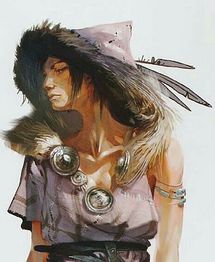
"You cannot do this, Dughall! Cromm Crúaich will NOT permit it. A vates can never be raised."
"I must do it, An-druis. Tamra was handfasted to me, and bore my son!"
"And blessed were you that your handfasted was a vates, and your son born a diabhal, a gift from our god to one of his favored and to your chosen carnal oracle! ...But Cromm Crúaich has taken her!"
"I MUST BRING HER BACK, An-druis Elgine!" Dughall roars.
"Then, you do it without my blessing..."
Lost in his own thoughts, Bain barely hears the unremitting argument between the two druis. They had been at it for over an hour, and the last ray of the sunset gleams through the central menhir. The sunbeam streams up to the edifice, lighting upon the body of his mother, the departed vates, Tamra. This last sunbeam illuminates her brown hair and fair-skinned face. Even within death, her beauty shows. Tamra lies in a burial shroud, preserved by the arts of the druis. The body of a vates is preserved for three months and will not decay, until burial. For now, his mother wears a diaphanous frock and a thick shawl.
Bain barely registers as Dughall beckons. Father and son leave the temple, in silence. The young tiefling is silent in grief, and the older man silent with rage.
Failed resurrection!
Still in shock, but obedient to his father, Dughall bears Tamra's body, in his arms, to a clearing the next night. He sets down her body next to the pit dug. Then tiefling grabs the firewood, and quickly lights the fire in the pit. Dughall unwrapps her body from the burial shroud, and begins the resurrection ritual.
An hour later, with a final chant, Dughall slices the palm of his hand with an atheme and and sprinkles the blood onto Tamra's corpse.
As the blood hits her cold face, a harsh bellow rings out, "NO! I forbid it, Dughall!"
An-druis Elgine leans on his staff, panting in exertion, as he steps into the clearing.
"An-druis, you should not be here," Dughall growls. "I cannot have you interferring!"
The world seems to slow down, as Bain sees his father plunge the atheme into the chest of the elderly An-druis. The high priest gasps, and cries his dying breathe to Cromm Crúaich. Black tar materializes from the ground, and bemires father and son. The world shifts . . .
For two decades, Carrion's father was handfasted to Tamra, and out of their unions had come poignant visions and had come himself. Bain, later Carrion, was their only child - a diabhal, or tiefling - and the reason why the druis of Cromm Crúaich considered their family blessed. At the moment, the tiefling didn't feel 'blessed'; all he feels is... a distant pain, another loss.
Obligatory planeswalker
Bain stands before a mighty bone fortress, surmounted by a skull with its eyes flame. Behind is a great sea, its dark waves crashing. The black tar-like substance surrounds his father. In horror, the tiefling tries to remove it - to no avail. When the substance finally recedes, Dughall coughs violently. Wheezing, he waves his son closer.
"Listen, boy, I heard the wrath of my god, of Cromm Crúaich - from one of his emissaries!" Dughall rasps. Tears run down his cheeks, and the light was fading from his face. "I am cast out. I have no place in this, the realm of my god - exiled before its very gates!"
"Take this, Bain!" His father hands him a sigil. "It will summon a being of cunning, if you learn how to use it. Sadly, I'm done for. Leave me!"
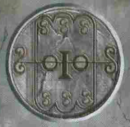
With a shout, the former druis shoves his tiefling son. The lad cannot resist. "Cromm Crúaich's emissary gave me one instruction after I was cast out of my god's favor: find a coin of silver - a portal to the Concordant - and never come back!"
Tears in his eyes, Bain is unable to speak. The lad simply begins walking, hoping to find his father following. But as the colors became less vivid, so too do his despair and apathy. He simply walks the shoreline ...
... Days later, he sees the bright gleam of a silver coin, spinning. Phlegmatically, the tiefling walks towards it ...and through it. Miles in the distance, he sees three active volcanoes, spewing ash and lava into the air. The lad shrugs and heads towards the Gate Town of Torch!
Feeding carrion?!
The tiefling lad awakes, groaning. "Where am I?"
A red-headed tiefling girl sharpens into view and she speaks in a sultry tone. "Tag's Jinx-of-Desire. Looks like the slave catchers struck yer brainbox hard, got ya jangled up."
"Tag? Um... I'm Bain."
He looks around. The sandstone walls and roof enclose a well-lit, expansive room. Bunks and rough couches line three walls. Training dummies stand in the room's center, and racks full of mock weapons line the fourth wall. A large iron door, no doubt locked, was the only entrance. Several others occupy the room, of varying races. All are dressed in simple loincloths.
"Is this a barracks?" Bain asks.
"Aye, the barracks for the 'newly enslaved gladiator scum', the guards told me. We ain't allowed outside, which is the berg of Torch, if ya wonderin'. Hear trainer's comin' soon. Don't make the trainer narky, huh? You're too cute." The compliment seems sincere.
The iron door clangs open, and a tough, scarred half-orc leers at Bain and Jinx-of-Desire for a moment and then at the other slaves. Several seconds pass.
"Front and center!" he barks. "I am Aruzar, but you newbloods will call me 'Master Aruzar'. My job to train you sorry sods. Got that?"
When no one responds, the trainer scowls and growls, "Yell, 'Yes, Master Aruzar', if you understand, leatherheads!"
"Yes, Master Aruzar!"
"Good. Now, time to begin. Pick up a training weapon and find a partner. Anyone I see slacking off, they get beaten." The half-orc flicks his whip. "Your first fight's in two months, and we can't afford for you to disappoint the crowd!"
"Oh, and pretty boy!" Aruzar points at Bain. "You got a new name: 'Carrion'. Why? 'Cause you'll be feeding the carrion birds 'fore the month's out."
Bain - now Carrion - tries, and fails, to keep a glower from his face. This earns a hard sock in the mouth. Grunting, he finds a wooden sword and takes a stance opposite Jinx-of-Desire.
Gladiator
There are four gladiators in the Soul-Mob Scourge squad: Carrion, the Celtic tiefling, armed with a greatsword; Little Soldier, a mephling who uses a whip and a dagger; Vapor, an odoriferous, obese human, who wears weighted boxing gloves; and Jinx-of-Desire, a tiefling gladiatrix and Carrion's mistress, who wields a short, triangular sica blade. The arena is located in the middle ground of the Maygel, past all the sales pitches and pickpockets. The other two mountains, Karal and Dohin, stand tallest and tilt inward, respectively, beyond squat Maygel; but the arena is visible throughout the city.
The Soul-Mob Scourge has been in several successful matches, and the squad knows their work! This cycle is no different. Jinx-of-Desire is the honey trap, who lures opponents away from their formation. Then, Little Soldier flanks them, while Carrion and Vapor hit them from behind - a classic hammer and anvil attack. Their opponents, a mix of duergar and Githzerai, fall for it beautifully. The crowd cheers, and the squad bows as they leave the arena.
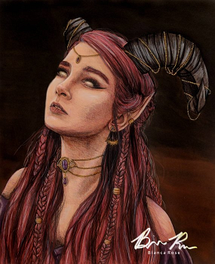
After the match, Carrion and Jinx-of-Desire return to their case, as is their wont. Meanwhile, Little Soldier and Vapor head to the tavern. He and Jinx-of-Desire enjoy viperwine (interspersed with antidotes) and then each other's bodies. As gladiators, both had varied partners and fancies; but after a match always sees them alone together, exultant in their mutual lust. There is just something about the adrenaline rush and the sickly-sweet aroma of her, which makes Jinx-of-Desire ravishing!
The next match, a few days later, is a bait-and-switch. Before the match, Carrion summons Amon, The Void Before The Altar. In his downtime, the tiefling learned the secrets of the seal his father had given him. He now uses chalk to draw the seal of the vestige on the stone floor of the holding cell. A burst of black smoke rises, and the vestige howls curses. Amon is a former deity of light and justice now twisted into a monster of wrath, manifesting as a black wolf with a ram's head and a serpent for a tail. The ram’s head turns upon the wolf body, and the serpent tail flicks. Amon growls, and fire escapes his mouth.
“Why do you summon me, mortal?!”
“I demand a pact with you, Amon, The Void Before The Altar! Grant me power to defeat my enemies.”
“So be it!”
Ram’s horns, the sign of Amon, temporarily grow upon the sides of Carrion’s head. He grabs his greatsword and then smears the seal.
What the gladiator squad expected when they enter the arena are some elves; what greets them is… a gehreleth! The tall, slender farastu takes one look at Vapor, and then crushes the fat man's head. Carrion charges the farastu, Amon’s horns down, and the horns stick to the creature. A glancing strike sends Carrion flying, and he blacks out to the sound of Little Soldier's cursing.
When Carrion awakes, the tiefling is told that he survived the farastu, but the half of his squad had not. Little Soldier killed the farastu, but not before it killed the others. Jinx-of-Desire's body is so crushed, apparently, that nothing but paste is left. The loss of his lover causes a cruel, smoldering rage in Carrion. He ponders whether losing friends for years, until he died himself, a forgotten slave-gladiator, is worth it.
After a few days of recovery and mourning, Carrion walks… past the Blood Swamps, towards the Outlands!
Warrior-Scholar!
It has been three years since Carrion fled Torch, leaving behind the life of a slave-gladiator and tethered with the memories of his dead gladiator team - especially the memory of his lover, Jinx-of-Desire. It took months to get beyond the River Ma'at and reach Tir fo Thiunn. Even Carrion wasn't sure how he was able to avoid the Torch slaver patrols sent after him, but he did. Eventually, the tiefling ex-slave-gladiator made his way into Gwyllach. Safe from the Torch slaver patrols, Carrion makes his home in a remote cave and studies the mysteries of the vestiges. First, the tiefling draws the seal of Amon, The Void Before The Altar, as he learned to do what seemed a lifetime ago. Next, the binder draws the seal of Naberius, The Grinning Hound. Naberius is a cunning and mysterious vestige, ancient and manifesting as a three-headed hound. Drawing the seal on a daily basis, he seeks the secrets of altering his form, cogent speech, and commanding others.
Carrion draws the seals on the floor of his cave with charcoal, then consults with the vestiges - aware that the information they provide is unreliable, but sometimes bears a resemblance to truth.
Every tenday, Carrion heads to the nearby village to trade for food and news. To the villagers, he is a tormented man who commands a modicum of respect. The tiefling studies reading and writing with Connacht the scholar, in exchange for tales of his homeland. Connacht had a surprise for the binder this day.
“Carrion, come in!” said the jolly old man.
“Good cycle, Connacht.”
“No lessons this cycle. Instead, I want you to consider something. In the three years you have been my pupil, you have progressed well. In exchange for further lessons, I would ask you to come in for a second cycle and help copy documents.”
Taken aback, Carrion shakes his head. “Well, I’d almost run out of stories to tell of Coimhlint Ghéar and of the Cruithne. I will consider your offer and return one cycle earlier than usual with my answer.” “Do that! In the meantime, I’d like you to consider another choice. Gorsedd, the innkeeper, has chant. Farewell!” “Watch the spire then, Connacht!”
The tiefling heads towards the homely inn. Inside, the well furnished tap room is full of shocked and angry voices.
“How dare the fiends do that?!”
“I hope the Planes Militant gives them what for!”
The cries and oaths ring out for several moments, before the villagers notice Carrion. Most wave or nod respectfully. The tiefling orders some ale from the pretty barmaid, Caoilinn, and she mouths, ‘See me later?’ and then takes another order. He nods, and she smiles mischievously.
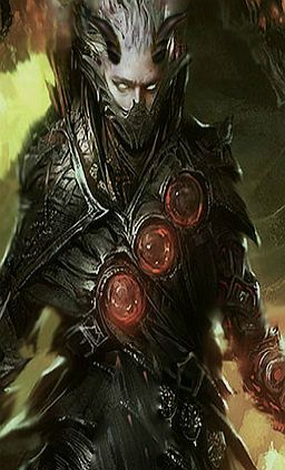
“Carrion, we were just reacting to the crier’s chant. There’s a scar in the sky over Plague-Mort!” the portly innkeeper informs him.
“Oh, by Cromm Crúaich, Gorsedd! Did I hear you correctly? A scar in the sky…?”
”Aye, you heard right.”
Carrion finishes his ale and pays his fare. The Binder returns to his cave, a journey of two hours. Dropping his provisions, Carrion draws the seal of Amon and begins the summoning.
“I shall go to Sigil, because that is no doubt the goal of the tanar’ri. Fiends ruined my Prime, and I won’t see them ruin the Planes as well!”
Carrion Sùil~taibhseár, the tiefling Binder, and his now grim visage stare into the room's fireplace. The tiefling shoots the tumbler of viperwine, quaffs the antidote, and orders a second flask. He tries to mentally suppress the flood of inner pain, the thirst for his former lover. The musicians start to play, but he is still lost in his memories. In a way, their liaison was the reason Carrion and Jinx-of-Desire both survived so long…
The viperwine hadn't assuaged the pain, the knot in his heart, at all. His mother, father, and lover - all gone - were reminders of life's cruelty, a sick joke.
Next cycle, the tiefling heads to Hall of Speakers . It's on to bigger problems now. Carrion, former gladiator of Torch, now Binder... was in Sigil, within Airion’s Boardinghouse; and he turned his thoughts to 'truth of the multiverse', to belief, and to imagination!
The Prime of Coimhlint Ghéar
Coimhlint Ghéar - onetime environ of Carrion Sùil~taibhseár - is unique in that it is a flat, table-like Prime. Around the edges of the annular slab, impossibly high peaks and sierras stretch towards the crystal sphere and prevent even spelljammers, or magic, to enter the Prime via the phlogiston. Coimhlint Ghéar is a mostly verdant, temperate world, but it is rife with the struggle between the subdued lands of civilization and the untamed wilds.
The lands of the Cruithne contain rolling hillocks, beautiful rivers and lakes, sylvan groves, and lofty escarpments. To the northwest, the taigas and towers of the shadow elves overlap the Celtic lands. Far north, antediluvian forests lead to great mountains, covered in ice. The southwestern desert is spotted with rocky cliffs and oases, wherein the hagspawn build their trade cities. To the east, there lies vast swamps, interspersed with the fortresses of the orcs and with willow woods. In the southern half of the orb, there are a great many tropical islands inhabited by a swarthy race of Scythic[1] seafarers. It is rumored that, in the furthermost reaches of the world, there tarry the formerly dominant, the fey-like Aos Sí and the cyclopean Fomoire.
The Cruithne
The Cruithne are the former klatch of Carrion. These lands are two nations in one, bound together, yet distinct. In the plains and lower forests live the daonna ó thuaidh, Celtic humans united in their tribes and villages. In the tors and deep forests, reside the scáth imsheé, elves of dark hair and almost ivory skin. The larans of the scáth imsheé stay apart from the kings and queens of the daonna ó thuaidh, despite both groups serving the same High King. Thousands of years ago, a great lady of the scáth imsheé and a courageous chieftain of the daonna ó thuaidh wed - strangely, for love. Since then, the nations have been considered one kingdom.
The insular larans (lords) of the scáth imsheé, fair of skin and red- or brown-haired, rule in the tors, within their mines and fastnesses. Reclusive and cold-hearted, few of the pale-skinned elf lords or their retainers leave the tors or ancient forests in the north of the lands of the Cruithne. The servitors of the larans trade for slaves, bringing their master-forged arms to the lands of the daonna ó thuaidh (and kingdoms beyond). The scáth imsheé worship many of the same gods the daonna ó thuaidh do, in addition to Corellon Larethian, Angharradh, Fenmarel Mestarine, and Kiaransalee.
The freemen among the Cruithne are the farmers and the tradesmen who reside within clann regions; the bulk of which are of the daonna ó thuaidh, but also many half-elves. Men and women engage in handfast, but this does not preclude fornication with others besides their chosen mate. Daonna ó thuaidh, both men and women, train as warriors and are conscripted, by lots, into the armies of the clann as retainers. As children, they learn the basics of the nearby nations and their enemy nation, the Moryatsi. Freemen live in thatched hovels, hunting lodges, or large homesteads, depending on their wealth.
Beneath the freemen are the daor, debt-slaves. Many daor are half-elfs or half-orcs, born to poor families. Many are sold, as children, to the mines or ore refineries of the scáth imsheé; while other half-breeds are abandoned and placed in the orphans' asylums, where they incur a debt for their care. They are not permitted to handfast, though are encouraged to copulate among each other, and daor are forbidden spear or sword. On rare occasions, a debt-slave earns enough to gain her freedom and gains status as a freewoman.
The Cruithne are ruled by the Ard-Rí Cruith, who resides at Na Seodra, "The Jewel of the Cruithne". The Ard-Rí is always a Celt of pure blood, elected for life by the rí-ruir (kings), by the banríon (ruling queens), and by the larans of the scáth imsheé. The Ard-Rí always takes a noble consort of the scáth imsheé, who is known as the co-chòrdadh àrd. The Ard-Rí and co-chòrdadh àrd often take other, more casual mates for pleasure and keep the bloodlines pure.
The rí-ruir and the banríon meet every season by the will of the Ard-Rí Cruith, at Na Seodra, to hold the Comhdháil on Holy Days: Samhain, end of the harvest and beginning of winter; Imbolc, beginning of spring; Bealtaine, halfway between spring equinox and summer solstice; and Lughnasadh, beginning of harvest season. The isolationist larans of the scáth imsheé attend only Bealtaine.
Blood feuds are suspended during Holy Days. Wine and mead flows freely, and the retainers of the lords mingle without consequence. It is not uncommon, during Bealtaine especially, for various couplings to conceive half-elven issue.
Religion is very important part of the lives of the Cruithne. The Cruithne chiefly worship the Celtic Pantheon, especially the Daghdha and Cromm Crúaich, an aspect of Arawn. The priesthood consists of the druis, subsequently the extolled vates. The druis act as intermediaries between the Celtic gods and the Celts themselves, opening and closing the Holy Days with rituals of human sacrifice and caring for the general needs of the Celts.
There is great rivalry among the druis orders of the various Celtic gods, mitigated by each druí order's communal role. Most important are the druis of the Daghdha, who construct and maintain the great standing stones for keeping of the times, and the druis of Cromm Crúaich, who officiate burials and perform human sacrifice to mollify their god. The druis of The Morrígan teach the art of war, while the druis of Oghma teach oration and history. The other druis orders are smaller in scope and purpose, but all the orders have their place in the communities of the Cruithne. A select few of the druis learn to bind spirits with sigils.
The druis believe that the fiends and celestials are the "minions of the gods". The fiends allow this fiction, while the celestials' denials of this go unheeded. Celestials are considered messengers of the brighter gods: the Daghdha, Belenus and Brigantia, and Diancecht. Fiends are viewed as tied to the darker gods: Cromm Crúaich, Math Mathonwy, and The Morrígan. The Aos Sí, or the Fey, and the Fomoire, or the Giants, are viewed as those who disowned the gods and who seek to lead astray the steadfast. Visits from Outsiders are taught, by the druis, to be omens.
The vates are nubile, female oracles, voluntarily isolated in temples by the druis of Cromm Crúaich and Math Mathonwy. The visions of the vates are triggered by fornication. Many vates consider it an honor to copulate with the druis of Cromm Crúaich and Math Mathonwy, but dread to do so with a half-fiend.
The vates live privileged lives, and they and their children want for nothing. It is not infrequent for a specific druis to handfast a particular vates. This is permitted, as long as her visions continue.
Tieflings and aasimars are rare but not unknown. Most enjoy special status as children of the druis. Tiefling bloodlines are the result of the mating of a half-fiend with a vates. When it is known that a vates has borne a tiefling child, the half-fiend father is killed, and the vates is permitted to become a druis. Tieflings descended from these bloodlines are usually the privileged children of the priests of the darker gods. As a countermeasure to the minor fiendish influence in Cruithne lands, many female druis of Belenus and Brigantia seek to lie with those aasimon who serve these two gods. Aasimar of these bloodlines tend to become famous, considered blessed by the gods.
Dominion of Vecculka
The daoine glasa, the orcs of Vecculka, in the orcish tongue, inhabit a land of aiguilles and quagmires. Within their harsh land, the orcs have built great fastnesses and dug large cities beneath the morasses. The most important part of each of these cities are the "fanes of the soul", where the tranquil Archons teach of harnessing essentia and chakras. (The druis of the Cruithne revile this form of magic, which they believe is called "incarnum".) Though dangerous warriors, the orc leaders have learned to temper their racial rage by these teachings.
On the borders of the Cruithne lands and the Dominion of Vecculka, many of the Cruithne freeman trade among the daoine glasa. Along with exchanges of goods, naturally, comes exchange of passion, and many half-orcs have come from these unions. The leaders of both lands discourage this, but the hotblooded youth of both peoples unwontedly enter into these (usually temporary) unions.
Oases of Dreams
In the deserts of the southeast, a land of mystery lies. The wild cities of the hagspawn, centers of trade and jubilee, beckon. The brown-skinned, mystical hagspawn, the sons of the sand hags, build wealth and practice mysticism, luring humans and half-orcs to their domains, as mates and trade partners (often as both at once). Beneath the veneer of the wealthy cities, deep within the oases themselves, their rulers, the sand hags of the Covens, deny entrance to any but their children.
The Moryatsi
The people of the north know very little of the Scythic Moryatsi, but some facts have been gleaned from the rare Moryatsi slave. The Moryatsi are ruled by sorcerer-kings, known as králs. The králs are at constant warfare with each other and with the north. These ruddy-skinned southerners worship Fiends and view their summoning as a religious obligation.
These Scythic islanders are accomplished shipwrights and archers, who frequently raid the lands of their northern neighbors. Northern youths and maidens (as breeding slaves), precious metals, and furs are much coveted by the Moryatsi sorcerer-kings. It is whispered that the islands of the south are barren (truthfully, the islands are not), and so the bloodthirsty králs seek to constantly reinvigorate their rule with successful raids (which they do). Such raids are, of course, not always successful. Furthermore, vates who flee their voluntary isolation - a very sporadic event - have been known to join Moryatsi, and these vates become corrupted by král sorcery. Centuries of conflict between the Moryatsi and the north has only widened the gaps of misunderstanding and hatred.
There may yet be more lands, beyond the islands of the Moryatsi. Other nations and city-states no doubt abound, likely engaged in their own wars with the Moryatsi and with each other. Rumor has it, the ancient hideaways of the Aos Sí and lairs of the Fomoire lie at the edges of the Prime and can be reached by the intrepid, but foolhardy, explorer.
Objectives
Imagineer of the Multiverse
1. Seek to discover the truth of the center of the Multiverse by examining the edges of it and the cracks between it. Thus, "proving" oneself as one of the Imagineers of the Multiverse.
2. Establish himself at the Hall of Speakers, garnering respect and rank within the Sign of One.
3. Form a Signer think tank; imagine the edges and the cracks.
4. Find the body of a dead god.
Pilgrimages
1. Visit the ancient city of Corrieton, within Math Mathonwy's realm of Corriegrave.
2. Fight on the Bloody Fields, within Tir Na Og, realm of the The Morrígan.
Allies & Foes
Associates
1. (Part of) Sign of One.
2. (Approves of) Dispossessed, the Verdant Guild, (hedonistic) Sensates.
3. Followers of Math Mathonwy, The Morrigan; the Celtic Powers at large.
Nemeses
1. Paladins and goodly Clerics/Divine Agents (in general).
2. Bleak Cabal, the Harmonium.
--Sam Brockmann (talk) 23:18, 27 August 2019 (MDT)

